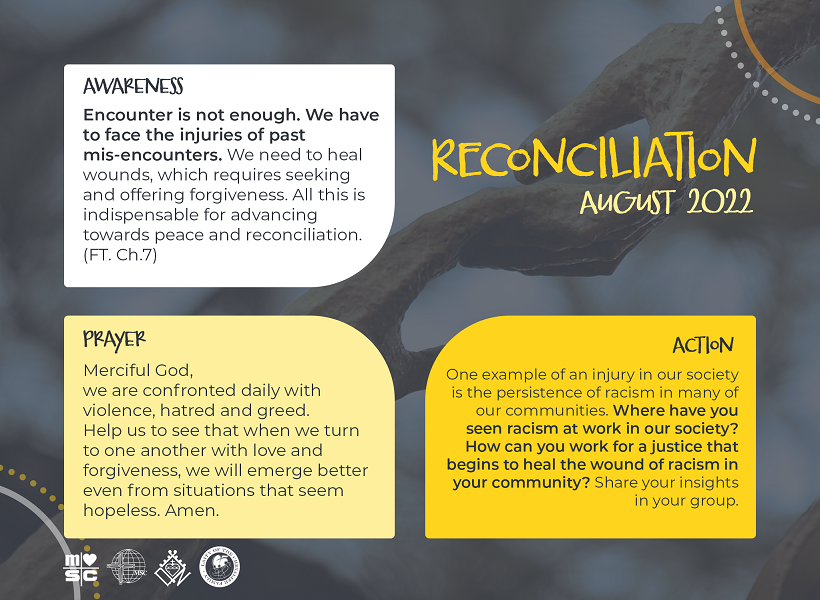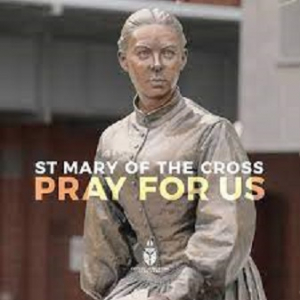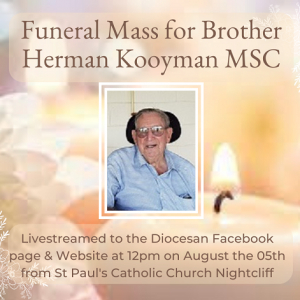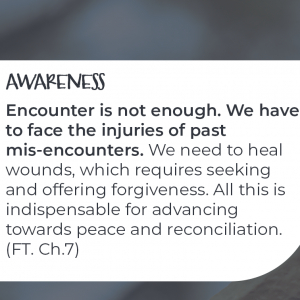Peter MALONE
Best of Enemies/ 2019
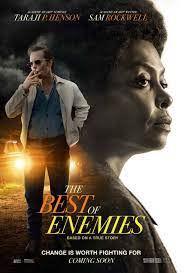
THE BEST OF ENEMIES
US, 2019, 133 minutes, Colour.
Taraji P.Henson, Sam Rockwell, Babou Ceesay, Anne Heche, Wes Bentley, Nick Searcy, Bruce McGill, John Gallagher Jr, Nicholas Logan.
Directed by Robin Bissell.
Here is a film that is little-known, little seen, but repays viewing. Title has the comic, ironic touch, and that is true. However, there is so much more to the film than an ironic title.
The action in The Best of Enemies takes place almost 50 years earlier, Durham, North Carolina, 1971. Which indicates, correctly, that this will be a film about racism and civil rights. While Martin Luther King has made his mark during his life and in his death, there are still issues in ourselves, especially about segregation and school integration.
We are introduced to the two central characters, the two competence. Tarajji P Henson plays and Atwater, a middle-aged organiser amongst the African-American community. She is strong-minded, and strong in action. On the other hand, there is C.P.Ellis, played by Sam Rockwell, a garage mechanic, but head of the local Ku Klux Klan. Potential enemies, certainly.
This is a film that can be watched by any audience. There are some scenes of racial menace, three members of the clan immediately after a meeting getting their guns and firing into a house to intimidate a white activist, the organising of the local police to close down on technicalities a business run by Vietnam veteran who employs black managers, a sense of menace, sexual, again on a white activist. However, these are in context and, by and large, it is the resolving of the racial tension in Durham that is the major focus of the film.
When part of the school for Blacks burns, the issue is whether the black students will go to white schools. A judge is appointed to mediate and is advised to set up a charrette.
[Some time out to understand the meaning of charrette, the word unfamiliar to this reviewer:
from Wikipedia: The word charrette may refer to any collaborative session in which a group of designers draft a solution to a design problem.
While the structure of a charrette varies, depending on the design problem and the individuals in the group, charrettes often take place in multiple sessions in which the group divides into sub-groups. Each sub-group then presents its work to the full group as material for further dialogue. Such charrettes serve as a way of quickly generating a design solution while integrating the aptitudes and interests of a diverse group of people. The general idea of a charrette is to create an innovative atmosphere in which a diverse group of stakeholders can collaborate to "generate visions for the future".]
A charrette seems quite unlikely for Durham, North Carolina, 1971, especially when the mediator, an African-American educator from Riley, nominates Ann and CP as monitors of the charrette.
Needless to say, this provides quite some drama, during the meetings and outside the meetings, especially with CP’s visit to his institutionalised Down Syndrome son and domestic scenes with his wife, and hate, as well as Klan meetings, and the pressure put on them by the local city authorities. And, on the African-American side, intensity of discussion, protests.
The charrette reminds us of the Truth and Reconciliation work in South Africa after the end of apartheid. Seemingly impossible, getting two sides to meet, talk and listen (no easy task, no quick solution), formulate lines of action. In this film, it is CP who has the final casting vote for a significant abolition of education segregation.
As with films based on true stories, the two characters appear during the final credits, the real And, the real CP and the extraordinary career they had together working to breakdown prejudice and racism.
- American racism, the southern states, North Carolina, hostility and hatred, the Civil Rights Movement, the challenges in the 1960s and 1970s? Possibilities for reconciliation?
- The changes in the United States from the 1960s to the early 21st century? Continuing racism? Changes, acceptance, integration?
- The background of the Civil Rights movement taken for granted? References to Martin Luther King? School integration? The white citizens of Durham, North Carolina, racism and bigotry, overt hostility, superiority? The black citizens, subjected to racism, lack of opportunities? Militancy on both sides?
- The Ku Klux Klan, the meeting, the motto, white males, the desire for one nation, the pledge against communism, integration and mongrolism? CP Ellis as the leader in the town, his status, support? The aftermath of the meeting, getting the guns, tracking the white woman, shooting into her house? Intimidation? And all in the name of principles and God?
- Ann Atwater, an organiser, strong-minded, meetings, defiance, support, her daughter and school?
- Education, no integration, the burning of the black school, the rescue, the dilemmas, lack of facilities, joining facilities? The hostility of the white citizens?
- The white men, led by the chairman, initially seeming peaceful, listening to Ann Atwater, but ensuring the stacking of the meeting, working behind the scenes, chairing the meetings, the decisions against the black citizens? The other white members, the bigoted teacher, the officials of the town?
- The education situation, the judge, the hearings, Riddick, coming from Raleigh, the suggestion about the charette, the judge accepting this?
- The personal touch with CP Ellis, at home, his daughter, his wife? Going to the psychiatric ward, his son with Down Syndrome, his care? Ann seeing him there? The human touch?
- The setting up of the charrettes, legal expectations? Riddick nominating Ann and CP Ellis as chairs of meetings? The selection of the white and black representatives? The townspeople coming to the meetings? The speeches, the discussions, declaration of stances? The group work over the two weeks?
- White intimidation, Ellis’s friends from the Klan, menacing the young woman in her home? Getting the police to close down the store of the sympathetic Vietnam veteran who employed the Blacks to manage the business? And Ellis’s respect for him for having served his country?
- Ann, visiting Ellis’s son, the change of room, payment, the radio? Ellis, his demanding manner at the hospital, wanting to talk with the white nurse, her defying him? His wife visit, discovering the move, his being content, the radio? The later going to visit and, coming in, the gift, the talk and respect, thanks? The effect on Ellis?
- The title of the film, the two, their stances, Ann and her severity, dislike of Ellis, spurning him, walking out? Ellis, dealing with black Americans? The device of having everybody have their meal adjacent to someone of the alternate race, and not talking about the issues? The effect?
- The setting up of the Klan uniform and literature, the young black men trying to destroy it, Ann and her intervention, Ellis watching?
- The buildup to the final meetings, the three statements, needing eight votes, the passing of the first two? The dilemma with the third, the intimidated young woman, the manager of the store and his standing on principles? The prejudice whites and their votes? The Blacks and their votes?
- The dramatic buildup to Ellis with his casting vote, his speech, the whites all in support, his tough friends from the Klan meetings, the fact that they had engineered to give him a special medal, his statement of what he had seen, the Klan’s motto for helping others, his memories of his ticket at the age of 12, sense of belonging? His statement that over the fortnight he had seen people helping others, tearing up his Klan card, and voting yes? The rejoicing, and going to find him, his leaving with his family?
- The aftermath, setting his service station fuel on fire, closing it off, his assistant offering to take a leave? The young Klan members driving past with contempt? And driving past, the convoy of cars, her organising skills, the customers?
- The final information, the fact that Ellis and Ann toured campuses for a long time, integration causes? The video clips of each of them, explaining what they had done, their personalities, working together? Bill Riddick and his reflections? And the member of Durham Council for 30 years?
- A worthy film, worthy characters, and a worthy cause? Impact in the 1970s? The lasting heritage?
Juniper
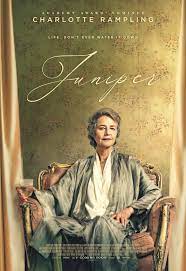
JUNIPER
New Zealand, 2021, 94 minutes, Colour.
Charlotte Rampling, George Ferrier, Marton Csokas, Edith Poor.
Directed by Matthew J.Saville.
In case any viewer was wondering why they should see a film entitled Juniper, here is some reassurance so that they won’t be wondering all the way through what the title means: ‘The juniper berries that dot the landscape happen to be the primary ingredient in gin, Ruth’s drink of choice.’
This is a small film, a small-budget film from New Zealand, with attractive photography of the Hills and countryside, but set mainly in the house and the grounds around it.
It is also a film about age, memories of the past and careers, injury and illness, death and preparation for death.
We are introduced to a father and son, Robbie and Sam, veteran Marton chokers and newcomer George Ferrier. Sam’s mother is not long dead and he is still grieving, sent to boarding school, religious, Anglican, Rugby playing, Maori and white students. But Sam resents it. And it is even more resentful with the news that his father’s mother, Ruth, from England, is suffering from a broken leg and is coming to stay with them, even in Sam’s mother’s room. He refuses to speak to her, have anything to do with her.
While we know where this is eventually going, it is the drama of looking at Sam, his ill feelings, even suicidal thoughts, and seeing how he is eventually going to be drawn into the ambit of this tough grandmother, a war photographer, self-confident, absolutely demanding at will and whim. And, who better to portray this kind of character than Charlotte Rampling, after 45 years of top lining such a variety of British, American and International films? Obviously, the film is worth seeing just to watch her performance.
Ruth sits in her chair, imbibing quantities of gin (mixed with 50% water, touches of lemon). Yet, she seems to be in control, demanding in her requests, ousting a well-meaning visiting Anglican minister, making demands on her longtime nurse, Sarah (Edith Poor), ringing her bell haughtily, making more and more requests of her grandson. While at times he is at the end of his tether, misbehaving at school and being expelled, even thinking of hanging himself until he encounters the affection of his mother’s horse, Sam is eventually drawn into Ruth’s ambit.
In the meantime, Sam’s father is in England working on business matters. Gradually, the relationship does build between Ruth and Sam, especially when she bribes some of his schoolfriends with alcohol to clean up the gardens and surroundings. And then urges Sam to throw a party.
However, we realise that Ruth not only has a broken leg, but she is ill, and the film moves towards an ending where Ruth wants to make if not peace with herself and God, peace with her son and grandson, even to a last rites ceremony and communion. With the doctors giving opinions and Ruth resolutely, even insultingly, refusing to listen to opinion and advice, the film moves towards a picture of family palliative care, assisting Ruth at the end, everybody going up the hill to view the sunset. It is a picture of a family ritual of love and death.
Small film. Brief running time. Significant themes. Strong performances.
- A small film, New Zealand, cast, themes, Charlotte Rampling?
- The title, the juniper berries, gin and Ruth and her love for gin, drinking throughout, inviting Sam to share?
- The New Zealand countryside, the hills, the weather, sunrise and sunset? The house, the interiors, the surrounding grounds? The school, the interiors, the rugby field, the haka? The musical score? The songs and their being sung at the dance, the ending?
- The situation, Robbie, not knowing his father, strange relationship with his mother, her absence and successful career, his marriage, he and his wife moving to New Zealand, her illness and death, Sam? Robbie having to bring his mother to New Zealand for convalescence?
- The home situation, Ruth going into Sam’s mother’s room, her nurse, her son dealing with her, Sam and his refusal? Robbie having to go to England, the phone calls? Sam and his suspicions of his father?
- Ruth, ensconced in the room, the gin and water, lemon, continued drinking? Ringing the bell, demanding? Sara, long time with Ruth, religious perspective, the Anglican minister, talking about death and hell, her ousting him? Sara upset? Sara demanding that Sam look after his grandmother?
- Sam, 17, relationship with his father, going to boarding school, still grieving his mother (and not visiting her grave)? His mother’s room? Trying to ignore Ruth? Playing computer games? Having to make up the gin, the wrong percentage, her throwing the glass at him, his standing and her throwing and hitting him? His resentful dealing with Ruth?
- His bike, in the countryside, the noose, his head in the noose, his mother’s horse, coming back? The issue of the party and his being drunk, crashing the car and Ruth later asking him whether he did it on purpose? Behaviour at school, trashing the principal’s room, expelled? The background of the school, proper, the communion ceremony, the rugby matches, the hiker?
- His adjusting to Ruth, the gin, Sarah showing him the book of war photos, conversations, her probing him, the friends and their cleaning the yard for alcohol, the throwing the party, Sam carrying Ruth and the dancing? An open attitude towards everything?
- His father’s return, Sam cleaning the grounds, Ruth and her going to hospital, prognosis, refusal of the catheter?
- The decision for her to come home, the group looking after her, her agreeing to see the priest, communion? Her love of sunrises instead of sunsets? The scenes at home, the dancing, with her son and with her grandson?
- The final decision, palliative care, going up the hill, watching the sunrise, her taking the medication, her death?
- The return home, funeral, ceremony, father and son, nurse? And the memories of Ruth, a future?
Sissi
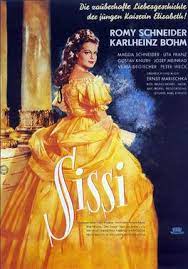
SISSI
Germany, 1955, 102 minutes, 109 minutes, Colour.
Romy Schneider, Karlheinz Boehm, Magda Schneider, Gustav Knuth, Uta Franz, Walter Reyer, Vilma Degisscher.
Directed by Ernst Marischka.
This is the first of a trilogy of films about the Empress Elizabeth of Austria, the longest reigning Empress in the Austro-Hungarian empire.
The series was made in the mid-50s, the time of popular historic pageant films, an emphasis on costumes and decor, lavish sets and backgrounds. (And a reminder that at this time there were not so many television programs dealing with history, with this kind of pomp and circumstance, fewer travelogues than audiences in the 21st-century take for granted.)
The first film focuses on the young Sissy, age 16, 17 children in a family of Bavarian nobility yet related to the Habsburgs ruling in Vienna. The father is jovial, not confined by protocols, the mother is ambitious, especially for the oldest daughter who is proposed to be the wife of the Emperor, Franz Joseph. The parents appear throughout the three films but especially strongly in the third film when Sissy is ill and her mother looks after her, with the attentions of her father.
So, the film opens with the beauty of the Bavarian countryside, transferring to the Viennese court and the lavish interiors. The Emperor is young, his mother a power behind the throne, organising his marriage. And the suggestion is Helene, Nene, the oldest of the daughters of the Bavarian family. Off they go to Vienna to celebrate the Emperor’s birthday.
The film is romantic rather than accurate historical, has a number of humorous scenes, even farcical (especially with the head of security and his mistaking Sissy’s identity). It is really like one of those operettas (and there is some singing and dancing) from middle Europe.
On the romantic side, Sissy, something of a tomboy, loving animals and hunting, escapes from the lodge and by chance, fishing, hook catches on the passing Emperor. They spend the time together, he not knowing who she is, his falling in love with her, her responding to him. Touch of Cinderella! She is forced to go to the Emperor’s birthday dinner where he discovers who she is, passing by the proposed fiancee, offering flowers to Sissy, inviting her to the cotillon. The Emperor has worked with his mother who bows to his decision (but who will reappear in each of the following films making huge demands on Sissy, eventually acknowledging her).
The film ends with all kinds of pageantry, especially the wedding. At the reception there has been Strauss music. At the wedding there is Handel and the Hallelujah Chorus. (In all three films, issy’s mother is played by Romy Schneider’s mother, Magda Schneider.)
The strains of real life, the demands of Empire, political difficulties and revolutions will come in the succeeding films.
Bullet Train/ 2022
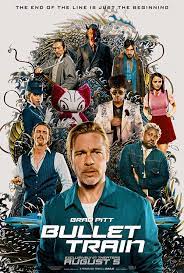
BULLET TRAIN
US, 2022, 126 minutes, Colour.
Brad Pitt, Joey King, Aaron Taylor-Johnson, Brian Tyree Henry, Andrew Koji, Hiroyuki Sanada, Michael Shannon, Sandra Bullock, Benito A Martinez Ocasio, Zazie Beetz, Logan Lerman, Zazie Beetz.
Directed by David Leitch.
Excesstravaganza. This one word review leapt exuberantly to mind and imagination during the final chaos (actually there was initial chaos, mid-chaos and then, even more so, final chaos), the multiple shootings, the sword combats, the explosions, the bullet train speeding off track, crashing. (Although someone did take umbrage at the chaos and excess and label it ‘an overstuffed monstrosity!’)
This is where one leaves one’s sense of realism at the cinema door, settling into the comfortable cinema seat for over two hours of action, action, action – although, especially at the beginning there is a lot of talk, talk, talk. And, our hero, a hired hitman making a comeback after a kind of nervous breakdown, ironically nicknamed Ladybug by his handler, does a whole lot of talking throughout, very conscious of therapy, offering advice on counselling and books to read, even when he is confronting mad assassins. And this is Brad Pitt, obviously enjoying himself no end, tongue in cheek, doing all the action, making the wry remarks, thinking he is down on his luck, but doing a great deal of surviving.
Actually, he had a kind of cameo role in The Lost City of Z doing these kinds of heroics (and the hero of that film, Channing Tatum, has a very humorous and cameo appearance here as a passenger on the bullet train).
Just as one is thinking that this is to be described as Tarantino-esque, somebody remarked that it is a rip-off of Tarantino but, to give the benefit of any doubt, it might rather be positively called a homage to Tarantino and his plotting, characters, love of talk, love of action.
And, it is all aboard the bullet train hurtling its way across the Japanese countryside, stopping every so often for just one minute before hurtling off again, destination Kyoto.
And, there are all kinds of killers and criminals on the train, also a mysterious briefcase of money which is Ladybug’s target, simply to find it and get off the train. No such luck, of course. So, we have a story of a Japanese father whose little boy has been pushed off a building, is in hospital, and the boy’s grandfather, a kind of warlord, threatening. Then there are flashbacks to a confrontation with martial arts fights, and a chief criminal called the White Death, whose son has been kidnapped and is on the train. He is in the care of two criminals nicknamed the twins, Tangerine and Lemon, Tangerine a very Brit Aaron Taylor Johnson, Lemon, black, American actor, Brian Tyree Henry, playing British with a mastermind knowledge of Thomas, the Tank Engine and applying it to his meeting and analysing opponents!
And there is a precocious young girl, the Prince (her father wanted a son!) who is no slouch on the assassination level.
Finally, the White Death appears brandishing guns and sword, played by Michael Shannon.
So, based on a Japanese novel, very much graphic novel stuff, highly stylised, lots of action (understatement), lots of shooting, plenty of deaths, lots of betrayals, and the deadpan dialogue (and a glimpse of Ryan Reynolds, who was the star of director David Leitch’s Deadpool 2 which you might miss if you blinked or were distracted by the shooting).
Huge budget, big cast, lots of effects, so that fans can feel they got their money’s worth.
Badla
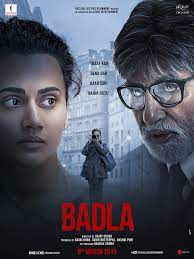
BADLA
India, 2018, 118 minutes, Colour.
Amitabh Nachran, Taapsee Pannu, Amnita Singh, Antonio, Aakeel, Tony Luke, Tanveer Ghani,
Directed by Sujoy Ghosh.
This film is a detailed remake of the Spanish film of 2016, The Invisible Guest, written and directed by Oriel Paulo. Those who have not seen the original film will be intrigued by this screenplay, the many twists and turns, revelations character, or turn at possibilities for the committing of a crime. However, those who have seen the original, complain that it is too direct a remake even if there are some gender reversals in the roles.
While this is an Indian film with Indian stars, it takes place in London and in the British countryside at a luxury hotel during winter, as well is in the forests.
However, the main part of the film is a lawyer arriving to interrogate the woman who has been accused of the murder, the corporate businesswoman who has been having an affair. There are flashbacks to the affair, time at the hotel, the return to London from the hotel and the lies, an accident, the death, not calling the police, a cover-up which leads to all kinds of complications. There is also a flashback to the situation at the hotel with the couple returning, an attempt at blackmail.
The lawyer, played by Indians veteran actor, Amitabh Nachran, as dignity, integrity, the skill in interrogation, proposing alternatives, demanding details of the truth, putting pressure on the client.
It is intriguing during the interrogation as various theories are proposed about the crime itself and the consequences, suggesting each of the participant taking a dominant role or a submissive role.
The story is also complicated by the death of a young man in the accident, the disposal of his car and body in the Lake, the intervention of his parents helping – and the revelation of who they are, their careers as actors, the wife becoming a relentless searcher of the truth, confronting the participants.
In fact, one of the main thrusts of the plot is very similar to that of Agatha Christie’s Towards Zero, the framing of the central character who is then seen as a victim – and then revealed as mastermind.
- Remake of the Spanish film? Direct? Reversal of gender for characters?
- Indian film, Indian stars? London and British locations? The city, the streets, apartments and offices, the business awards? The contrast with the hotel, the snow, the train, the railway station? The woods, the car crash, submerging the car? The friendly couple, their home? Atmosphere? Musical score?
- The film as a murder mystery? The investigation, truth and lies? The elaboration of different scenarios? The continued twists? Different behaviours for each of the characters? The final Revelation, the actor impersonating the lawyer? Naina’s plan, her vengeance, defeat?
- The basic situation, Naina and Arjun, marriages, children, the liaison, the rendezvous, the lies about Paris, phone calls reassuring spouses? The delay, the shortcut, the argument, the deer, the crash, the young man, dead, on the phone, the decision about the boot of the car, disposal of the car? Each re-enactment with Arjun and Naina reversing roles?
- The plan, the meeting, the blackmail, the hotel, locked doors, no escape by window, Arjun and Naina meeting, his death, her being wounded by the mirror? The police, arrest, interrogation, bail? Her contact with Jimmy, the lawyer? His recommending Mr Gupta?
- His early arrival, appearance, dignity, competence, briefcase, notes? The interaction with Naina? His insistence, perseverance? Turning the tables, eliciting more and more truth, attention to details? The phone calls to and from Jimmy? His proposing various hypotheses, the involvement of Rani and her husband, the reversal of roles between Naina and Arjun? His final persuasiveness, asking the truth, Naina’s admission? Getting her to look out the window at Rani?
- The revelation of who he was, taking the confession, going to Rani, the removal of the make up, the couple staring at Naina?
- The identification of the dead man, his parents, their search? The encounter with Arjun, his spinning them lies, and answer for every situation, going to the house, the car being fixed, Rani and her hospitality, their story, their son, the phone calls? The mobile phone and Arjun’s excuse? Rani, searching for him, bookseller in Notting Hill and his lie? Tracking him down, following him, the setup? The husband working at the hotel, the possibility for Rani to get in, to kill Arjun, ticket out the window? The photo with the husband when Naina was arrested? The later illustrating that it was a fake?
- Naina, the meetings with Arjun, the two possibilities for her to arrange it, him to arrange it, each dominating the other?
- The award, Naina and keeping her name out of police records, the deal, the Japanese?
- The confrontation between Naina and Rani? Rani condemning her for her love of power?
- The finale, that Naina had arranged everything? And the killing of Arjun?
SISSI: Schicksalsjahre einer Kaiserin/ The Fateful Years of an Empress
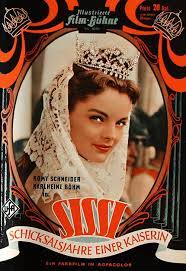
SISSI: Schicksalsjahre einer Kaiserin/ THE FATEFUL YEARS OF AN EMPRESS
Germany, 1957, 109 minutes, Colour.
Romy Schneider, Karlheinz Boehm, Magda Schneider, Gustav Knuthh, Uta Franz, Walter Reyer, Vilma Degisscher.
Directed by Ernst Marischka.
This is the third film in the trilogy, from the mid-1950s, about the Empress Elizabeth of Austria, with her popular nickname, Sissi.
This was a star vehicle for Romy Schneider at the beginning of her career. It was also a star vehicle for Karlheinz Boehm, starring in German films but, in the 1960s, also in Michael Powell’s Peeping Tom and as one of the Wonderful World of the Brothers Grimm.
While the first film introduced the young Sissi and her marriage to the Emperor, Franz, the second film showed the early period of their marriage, Sissi’s pregnancy and the birth of their daughter, the love between husband and wife, the suspicions and supervision of the Emperor’s mother, life of the court, pomp and circumstance, it also showed Sissi’s love for Hungary, and the hostility towards Austria – and her ability to break down the hostility.
It is something of the same in this film, more of a pageant, colourful costumes and decor, magnificent palaces and interiors, the beauty of the countryside, and, because of Sissi’s health, travels to Portugal and to Greece. It is the kind of material that is now supplied by so many of the documentaries about life and styles as well as travel documentaries. They were not so prevalent at this time and were incorporated into these feature films.
In this film, Sissi is spending time in Hungary which she loves, attended by Hungarian aristocracy but also absolutely charming those who are hostile to her. And she continues this throughout the film, especially towards the end when she and husband travel to Milan and to Venice, attempting to make peace in the Austro-Hungarian Empire.
There is always the melodrama of an illness, Sissi and her lungs, collapse, having to go to countries in the sun – where, in fact, she does fully recover, able to resume her duties as Empress. In the background is her mother-in-law, again intervening but finally accepting Sissi. There are also subplots concerning her parents, her brother and his marrying an actress and negotiations for her to become aristocracy.
Very much of its time, but a reminder for audiences who enjoy this kind of romantic pageantry, that royalty is always very popular on screen.
Towards Zero
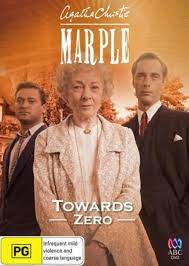
TOWARDS ZERO
UK, 2006, 100 minutes, Colour.
Geraldine McEwan, Greg Wise, Eileen Atkins, Julian Sands, Zoe Tapper, Paul Nichols, Saffron Burrows, Julie Graham, Tom Baker, Alan Davies.
Directed by David Grindley (and Nicholas Winding Refn)
A popular Miss Marple story, this film featuring Geraldine McEwan as Jane Marple, her performance is quietly sweet, gentle, even fey, always observing, always searching, formulating theories. At the opening of this film, she is in discussion with the doctor who has a theory that murders are a culmination of a process, a process towards zero.
The initial focus of the film is on Neville, Greg Wise, playing tennis at Wimbledon, gentlemanly, but gruff with his second wife, making plans to invite his former wife to the family home, which is presided over by the highly critical and crotchety lady Tressilion, Eileen Atkins at her typical and best.
The doctor dies. Lady Tressilion is murdered in her bed. The initial suspicion goes on to Neville but, eventually, he provides alibis. Those who are under suspicion include Neville’s two wives, Kay (Zoe Tapper) and Audrey (Saffron Burrows). There is also a man about town infatuated with Kay (Paul Nichols). There is also Lady Tressilion’s companion who will benefit from the will. There are complications as to which of Neville’s wives is to inherit.
Once again, Agatha Christie is a master of misdirection, Neville a victim, his being framed – and, Miss Marple nosing around the house, finding all kinds of different evidence, including an alternative to the golf clubs which seem to be the murder weapon, finally unmasking the villain – Neville who had cleverly framed himself with a plan that would indicate that he could not be guilty.
A note about the direction. Danish Nicholas Winding Refn, director of a number of tough Danish films with Mads Mikkelson, Bronson with Tom Hardy, films like Only God Forgives, directed another Miss Marple film and assisted with this one, uncredited. (And Alan Davies is rather stuffy, especially with his more genial participation in QIO over many years.)
- The popularity of Agatha Christie novels? Of Miss Marple? The three television actresses and their characteristics? Geraldine McEwan, sweet and fey?
- The setting, the town, the sea, the mansion, hotels, interiors? The background of Wimbledon? The setting for a murder? The musical score?
- Agatha Christie’s ability to misdirect attention? Neville as the central character, unpleasant, yet genial manner, his behaviour with Audrey, reconciliation with her, the marriage to Kay, his treatment of her? The murder, his being framed, the alibis, victim, yet mastermind?
- The introduction to the characters, the pleasant evening, conversation, the couples dancing? Neville, the background of Tom and his brother, death in an accident, Tom’s injured arm, working in the later? His return? Kay, her manner, spoilt? Ted, friendship, man about town? Dr Treves, the discussions with Miss Marple, his theory of the murder, working towards zero? Lady Tressiliion and, her manner, Mary and her attentiveness? Of the members of staff?
- The tennis, Neville, his loss, courtesy, reputation? The discussions with Kay, forcing her to go to the house? Inviting Audrey?
- The hotel accommodation, the visits, the meals, Lady Tressilion upstairs, the conversations with Miss Marple, memories of the past? The disapproval of Neville’s behaviour? Her death?
- Dr Treves, his story about the wilful boy and his vengeance, his heart condition, walking back to the hotel, upper floor, the lift out of order, his collapse and death?
- Miss Marple, her observations, speculations? Searching the house? Finding evidence?
- The possible suspects, their behaviour on the night, possible motivations? The issue of the will, which wife was to inherit the money, Audrey and the insults, her running to the cliff? Neville rescuing her?
- The evidence against Neville? But the mystery of Lady Tressilion and ringing the bell, the maid and string, seeing Neville the house? The time? Ted and his evidence, being with Neville?
- Everybody gathered together, the police inspector, rather humourless and straightforward (except for his glances at Audrey)? His assistant? Wary of Miss Marple, listening to her?
- On the boat, pushing Ted off the boat, his having to be rescued? Miss Marple and the explanation of how Neville committed the murder, setting it up, the boat, swimming back, the rope, the golf club, but Miss Marple discovering the knobs as the weapon, setting up the ringing of the bell, Neville changing his clothes? And the irony of the clue with the smell of the dead fish, the girl from the hotel, Neville leaving his clothes on the rocks after swimming?
- Neville his motivation, the revelation of his hatred for Audrey, her leaving him, planning leave with the brother and his being killed, her revealing years of Neville during marriage?
August 8th, St Mary MacKillop
August 8th, St Mary MacKillop
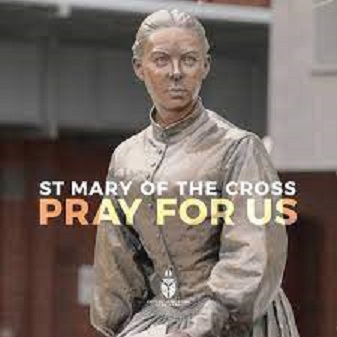
Australian MSCs wish the Sisters of St Joseph of the Sacred Heart a very happy Feastday. Many links of MSC with the Sisters – Mary MacKillop anointed by Fr Matthew Smith from Randwick, Paul Stenhouse and daily Masses at North Sydney in the latter 1960s, Tom O’Loughlin chaplain at Baulkham Hills…
And a reminder that quite a number of MSC had sisters who were Sisters – a total of 20 sisters.
Ed Bennett
Frank Crilly
Greg McCann Snr
Jack Burford, 3 sisters
James McNamara, 3 sisters
John Bell, 4 sisters
Norbert Earl (Sister Denis, former Superior General)
Patrick Canty
Paul Jennings
Peter Carroll
Stan Tyler
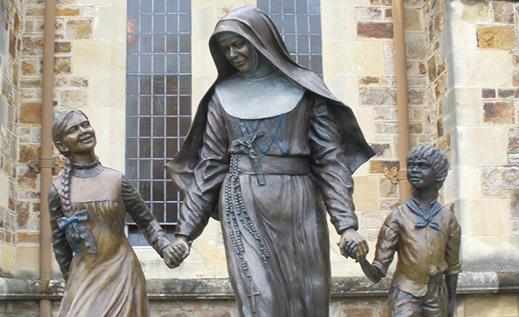
Terry Barry, 2 sisters
Eulogy, Herman Kooyman MSC
Eulogy, Herman Kooyman MSC
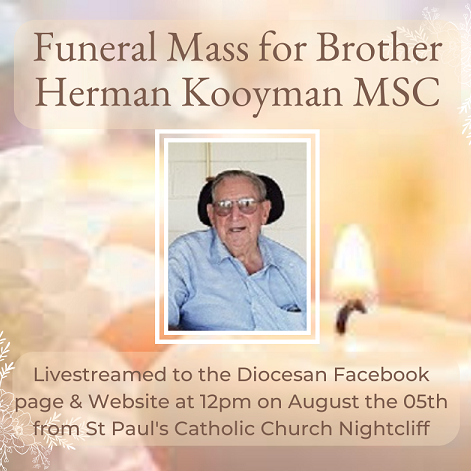
With thanks to Malcolm Fyfe, photos John Kelliher and of Herman’s craft, epecially at Downlands College, to Anne McAtomney, Chevalier Institute
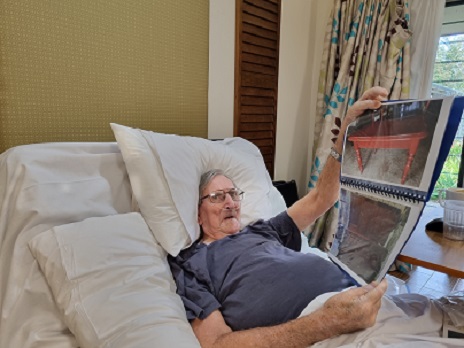
My soul proclaims the greatness of the Lord!
This expression of Mary’s joy that we heard in today’s Gospel, will find an echo in our hearts as we celebrate this special Eucharist, commending Brother Herman Kooyman’s soul to God, in anticipation of his mortal remains being consigned to the earth at the Missionaries of the Sacred Heart Cemetery at Douglas Park, New South Wales, in accordance with Brother Herman’s explicit request. And I can add that this sentiment was uppermost in Brother Herman’s thoughts and prayers as he prepared for the inevitable in recent months, looking back with thanks to God and a sense of satisfaction at having completed almost 60 years of religious life as a Missionary of the Sacred Heart.

His first Religious Profession takes us back to 1964: how impressive the realization that Brother Herman was helping to build up the Kingdom of God all these years. So, in spite of the loss we experience, whether we are family members, his religious confreres or simply his friends, at his passing from this world to the next, it is more important that we celebrate Brother Herman’s achievements and give thanks to God. Today, with Bishop Charles down in Alice Springs, Bishop Eugene Hurley, NT MSC Superior Father Leo Wearden, St Paul’s Parish priest, Father John Kelliher and I welcome all of you here present and those watching from afar. We invite you to join us in thanking God for all that Brother Herman was able to be and to do as a committed follower of Jesus and an outstanding Missionary of the Sacred Heart.
Hermanus Johannes Kooyman, to cite his baptismal name, was born in Holland on the 31st of August 1935 in a small town called Uithoorn, south of Amsterdam. He was the second of seven children, five boys and two girls. Of these, only his two sisters survive, Ellie and Anne.
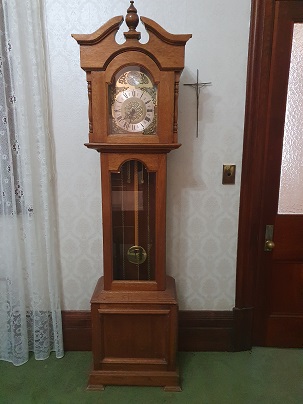
In those days it was a very traditional Dutch Catholic church that Herman grew up in. He said it preached not so much a loving God but a very thorough judge, who marked down in a big book any slight thing that you did wrong. Herman says it was not easy to unlearn those first impressions.
After finishing primary school just before his 12th birthday, Herman went to trade school for two years. This was somewhat like our modern-day TAFE courses. He learned carpentry and started work in a joinery shop at 15 years of age. We should remember that this was only 5 years after the Second World War had ended and that life was a struggle in those days.
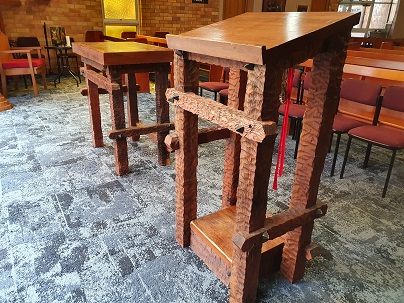
Along with many others from the Netherlands, his parents thought that there was not much future in the home country and they decided to migrate, but it was only after repeated applications that Herman, his father and elder brother arrived in Melbourne in 1952 while his mother and the younger children had to wait back in the Netherlands for another year before they could come out here.
The family moved to Queensland in search of work and Herman got a job with a Dutch builder in Brisbane. Employment conditions were not good so Herman went to Esk and got a job in a joinery shop where he says the pay was a little better.
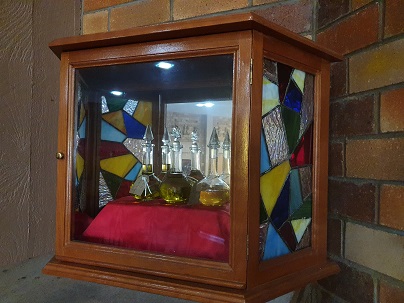
About two years later the family moved to Toowoomba, the main reason being that they could go to Mass regularly and there was catholic schooling for the younger children.
Let me say at this juncture, that across the many years I knew him, he was ever ready to share the story of his life in considerable detail.
In Toowoomba, Herman became very much involved with the YCW and it was towards the end of 1959 that he read an article in a catholic paper that said they were looking for lay people to go and work in the missions. Still single, because the right girl had not yet shown up, Herman decided to go and work in Papua New Guinea for two years. Herman saw the hand of God in all this because within a short time at Milne Bay in 1960 he felt very much at home there and it was Father Bill Ryan, a Missionary of the Sacred Heart, who suggested to him that he should join up as a religious brother. Milne Bay, as you may know, is at the far eastern tip of Papua New Guinea and was the site of a decisive battle against the Japanese invaders in 1942 that showed for the first time that the Japanese army was not invincible.

So, mid-1962, Herman came south for his Novitiate at Douglas Park. Herman told me that a year later, the Novitiate year behind him, on the very day he pronounced his first vows, he wrote a letter to the then Provincial, Father Leo McDougall, volunteering to go back to Milne Bay because he had fallen in love with that place, a feeling that remained with him all his life. However, it was only after 7 years spent as a brother in other houses of the Congregation here in Australia that he got back to Papua New Guinea at the end of 1969 and went to Hagita: his appointed task? To build a Church. Then he moved to Port Moresby where he worked for 6 years, after which he was able to return to his beloved Milne Bay.
He spent the next 10 years there doing a lot of building jobs including churches, classrooms, dormitories, convents, community halls etc. but then he got quite sick and was told by the doctors at the Mater Hospital in Brisbane that he should retire and it was then that he moved to Downlands College at Toowoomba in Queensland where he was diagnosed as having Spastic Paraplegia, a condition that only worsened with the passage of the years. In recent days, following news of his death, numerous tributes have been flowing in from Downlands College, mourning Herman’s loss and testifying to the respect and affection staff members had for him.
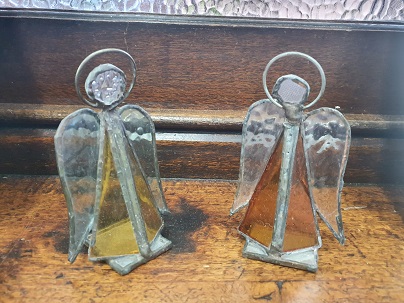
Clearly, at Downlands College Brother Herman kept very busy with furniture-making and other creative work and led a very full and constructive life. However in 2008, on a visit to Darwin, he succumbed to this city’s charms, partly he says, because it reminded him of his time in Papua New Guinea. He was always very happy here and hoped to remain in Darwin for the rest of his days. Here too he occupied himself in the making of all sorts of artefacts. He was in fact a highly skilled craftsman
During his time in Darwin his health issues kept on increasing. Due to his Spastic Paraplegia, he progressively lost the use of his legs and his mobility. And recurring ulceration of his legs meant he was spending long periods in hospital, to the point that after seeking medical advice, he underwent, first, the amputation of one leg and later the amputation of the other.
I want to acknowledge here the kindness and care that Brother Ted Merritt unfailingly showed to his confrere Brother Herman. No matter how tired he was after a day of helping Darwin’s marginalized residents, Brother Ted made it a high priority to visit Brother Herman on a daily basis, unfailingly taking a Magnum Ice Cream with him wrapped in newspaper from the Ranch at Nightcliff to the Pearl Aged Care Home in Fannie Bay plus occasionally, a cask of fruity white wine.

I want to say something about Brother Herman’s spiritual life, if I may. In talks with him, I could see that he was conscious of God’s presence and activity throughout the years of his religious life. One of his most treasured possessions was his Daily Office Book which has pride of place here today on his coffin along with a copy of the MSC Constitutions. He found the psalms and the daily readings nourished his prayer life. And although from time to time he expressed frustration at understandable delays between his calling for assistance from the staff and getting the help he needed, I never once heard a murmur of frustration or complaint about the disabilities and suffering that he endured in his own beleaguered humanity. He bore his monumental disabilities with impressive resignation. In recent talks with him he expressed calmness and a sense of peacefulness at the prospect of dying and meeting his Lord and Saviour, whom he was able to say with confidence, that he had faithfully served.
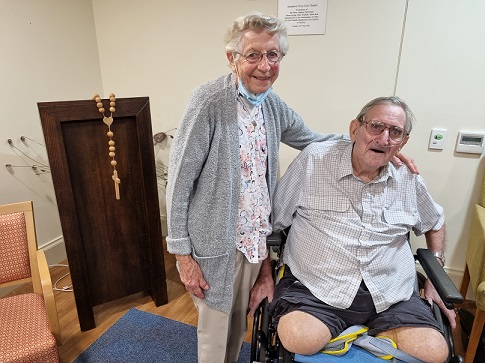
A highlight of Herman’s final weeks was the visit his sister Anne and her daughter Julie made to see him two weeks before he died. At that stage we were all falsely assuming that he had several months more to live. They are now very thankful that they made the trip to Darwin to visit him and spend a couple of unforgettably precious days with him. Father John Kellher enabled this to happen with outstanding hospitality. Anne and her three daughters, Julie, Dianne and Tracey, are now planning to fly down to Sydney for the Requiem Mass at Kensington Monastery and after that, will accompany the funeral cortege to Douglas Park where Herman’s body will be buried.
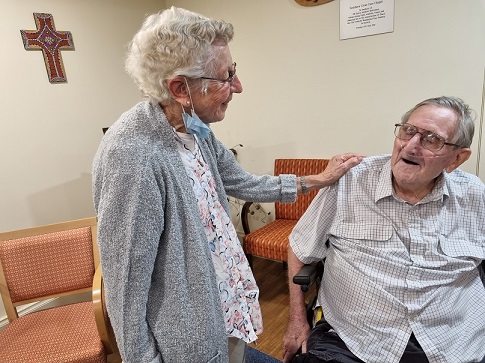
God was forever faithful to Brother Herman and Brother Herman has been very faithful to God. Just as Mary, from the very depths of her being, glorified God, - we heard her Song of Joy today in St Luke’s Gospel: ‘My soul glorifies the Lord’ - during his nearly 60 years of Religious Profession, Brother Herman continually gave praise to God through a religious life well lived. I am sure that Brother Herman is now in a far better place and can continue to make that thanksgiving his own.
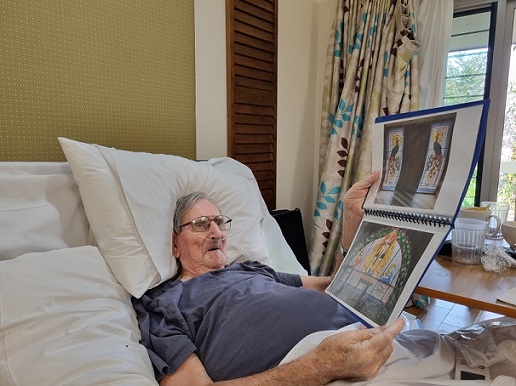
In this Eucharist we too join with him as we give thanks to God for the wonders that he worked in and through Herman, through an outpouring of love from the Sacred Heart of Jesus, under the maternal guidance and inspiration of Our Lady of the Sacred Heart.
Malcolm Fyfe msc 05.08.2022
Chevalier Family First Friday intention
Chevalier Family First Friday intention
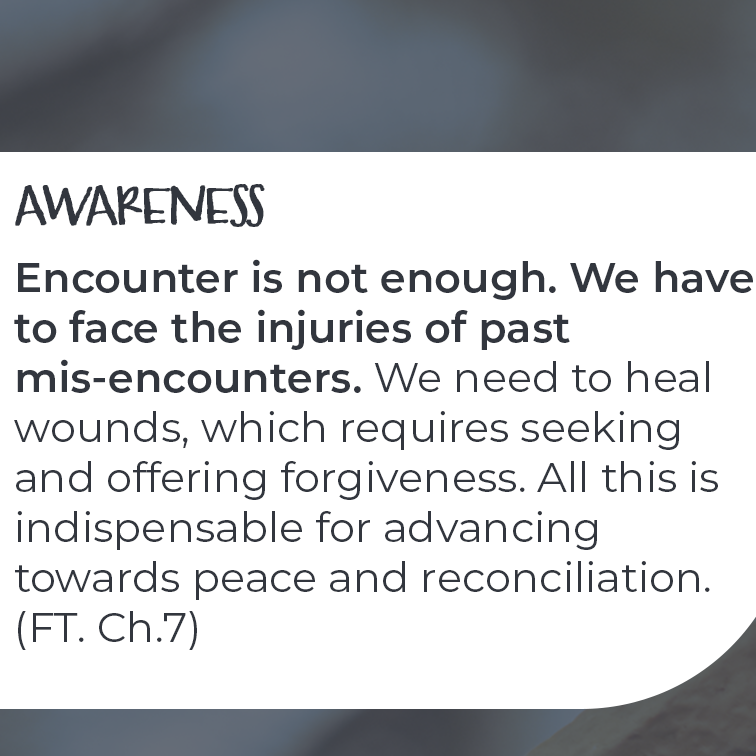
Each month a committee made up of members of the Chevalier Family, MSC, OLSH, MSC Sisters, Lay MSC choose a theme and send out a poster.

A facet of Heart Spirituality.
